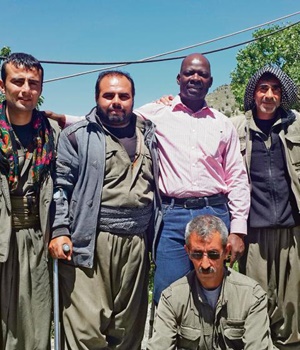
You can tell that SA Communist Party (SACP) second deputy general secretary Solly Mapaila’s 10-day visit to the Kurdish regions of Iraq and Iran made a huge impact. He talks earnestly, a passionate gleam in his eye.
“The Kurds suffer huge oppression in all four of the neighbouring countries in which they live: Turkey, Iraq, Iran and Syria. More than 50 million people without their own country have been living there for thousands of years and waging a struggle for national independence for decades. Thousands of them have been killed, including through chemical warfare.”
Mapaila visited the liberated zones of Kurdistan to “express our solidarity and get first-hand experience of the Kurdish liberation struggle”.
Mapaila was struck by the commitment of the Kurds to their liberation. “Their dedication, their willingness to sacrifice amazed me! The guerillas of the Marxist Kurdistan Workers’ Party (PKK) have to go through a long process of induction before qualifying. They have to meet very rigorous, very onerous standards. Those who are accepted see it as an honour.
“And they must be prepared to sacrifice everything, give their lives from the start if they want to join the armed struggle. They’re not allowed to marry! They can’t have children! No personal property! Their needs are very basic – and the movement provides this. When I met the President of the KCK [Kurdistan Communities Union], Cuma [Cemil Bayik] I learnt that the only clothes he had was what he was wearing then.
“I was also very moved by the way the PKK respected their dead. I visited the cemetery of the martyrs. I was surprised at how caring and meticulous they were. There was also a monument in the cemetery in which they had the few personal belongings of the deceased: the combat outfits in which they died, their boots, combs, brushes, spectacles, notebooks. And they had the photos of the comrades, with a brief history of each of them.
“One of the leaders explained that since they demanded so much from their comrades, they respected their dead. I think there’s a lot we can learn from them about respecting our fallen heroes and heroines.
“I also visited the torture chambers in Sulaymaniyah in Iraq where those fighting for Kurdish freedom were brutalised. The comrades converted this into a museum, a bit like our Constitution Hill.”
That this sense of sacrifice so resonates with Mapaila is hardly surprising. He’s known to lead a relatively Spartan life. He refused to accept salary increases for years and had to be forced by the SACP Politburo to take a better car after he had several breakdowns on provincial visits.
Mapaila explained that the PKK worked within the KCK, which was “a broad front of organisations committed to democratic confederalism, a social system they practise mainly in the liberated zones, which together is larger than the size of France”.
“The PKK,” he says, “is Marxist, but not Leninist. They don’t believe in pursuing state power. Their approach is shaped by the unique conditions and experiences of the Kurds scattered across four countries. A nation state is not an option for them, as it will mean changes to the borders of four countries hostile to them. The nation state, they feel, tends towards a single national culture and language and is intolerant of minorities. It is, they say, associated with the Industrial Revolution, but now hinders development, and has been outgrown by globalisation. For them, the collapse of the Soviet Union and other socialist countries also points to the failures of the state.
“So they want a a decentralised political system, with popular self-government, with full respect for cultural and linguistic rights. They refer to it as a democratic system of a people without a state. They place huge emphasis on gender equality and environmental issues. They have a co-presidential system with all structures having both a male and female leader.”
At its 13th national congress in 2012, the SACP gave Abdullah Öcalan, the imprisoned leader of the PKK, an award for his commitment to democracy and socialism. The PKK’s democratic confederalist approach was strongly influenced by Öcalan, who drew on the ideas of American anarchist philosopher Murray Bookchin.
Mapaila was struck by the extent of popular democracy in the liberated areas and the sense of community. While they must have their unique social tensions in these areas, they seemed to lack a materialistic ethos. He was surprised, too, by the ease with which the guerrillas interacted with the civilians. And he was bemused at the lack of borders.
“You couldn’t really tell where the liberated zones began and ended.”
Mapaila believes that not just the SACP, but the ANC alliance as a whole, has to support the struggle of the Kurds. “Cuma told me they are very inspired by Mandela and his commitment to negotiations. He said there were many values that came out of our struggle that they had emulated. But I think there are many things we can learn from their struggle, many values we can emulate. By identifying with their struggle we can reinvigorate our own.”
Carrim is an SACP central committee member and MP




 Publications
Publications
 Partners
Partners








